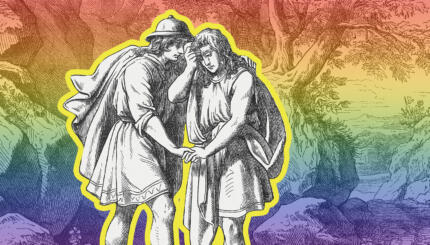Nursing an infant is a beautiful experience. It sensitizes one to the work of creation. It is indeed a miracle that a woman’s body is able to sustain her offspring. Nursing provides benefits to both mother and child. The mother receives great personal satisfaction from the physical closeness she feels to her baby. The mutual regulation of the mother’s and infant’s bodily needs is an important step in the development of trust and psychological well-being. The child, of course, receives the health benefits of the mother’s milk. Weaning is the end of a unique relationship between mother and child.
Isaac’s Weaning
“And the child grew up, and was weaned, and Abraham held a great feast on the day that Isaac was weaned” (Genesis 21:8).
Vayigdal ha-yeled vayigamal vaya’as mishteh gadol b’yom higamel et Yitzhak.
From the biblical text we learn that there was a celebration at the time of Isaac’s weaning. We suggest that this custom be reintroduced in our day with special blessings for the occasion. Weaning a child is an important time for both the family and the child, and there should be a Jewish ceremony to mark the event.

Help us keep Jewish knowledge accessible to millions of people around the world.
Your donation to My Jewish Learning fuels endless journeys of Jewish discovery. With your help, My Jewish Learning can continue to provide nonstop opportunities for learning, connection and growth.
Roles for Father & Mother
We believe that a Jewish ceremony should be created for this occasion that would be significant for not only the mother, but also the father. The mother can celebrate her ability to provide sustenance to her child. It would be appropriate for her to recite a blessing for having been able to nurse. In addition, a weaning ceremony provides a way for the father to express his appreciation for the care of the infant. Having witnessed this miracle of nature, he might express gratitude for God’s loving-kindness. Finally, it is also a time for both the mother and father to recognize their new responsibilities as Jewish parents.
It seems to us that the following the actual weaning would be an appropriate time for a ceremony. The mother might be honored with an aliyah [being called up to recite blessings over the reading] at the Torah service. It would be nice to bring the baby to the bimah–the platform where the Torah is read–at that time for a Misheberakh [a blessing in honor of a special occasion]. The father should be responsible for the “feast,” which could be held as the second or third Shabbat meal. At this time selections from Psalm 104 could be said (it is traditional to read this Psalm on Shabbat afternoon between Simchat Torah and Pesach):
Psalm 104
“Bless the Lord, O my soul;
O Lord, my God, You are very great;…
You make springs gush forth in torrents;
they make their way between the hills,
giving drink to all the wild beasts;
the wild asses slake their thirst.
The birds of the sky dwell beside them
and sing among the foliage.
You water the mountains from Your lofts;
the earth is sated from the fruit of Your work.
You make the grass grow for the cattle
and herbage for man’s labor,
that he may get food out of the earth–
wine that cheers the hearts of men
oil that makes the face shine,
and bread that sustains man’s life.
The trees of the Lord drink their fill,
the cedars of Lebanon, His own planting,
where birds make their nests;
the stork has her home in the junipers.
The high mountains are for wild goats;
the crags are a refuge for rock-badgers.
He made the moon to mark the seasons;
the sun knows when to set.
You bring on darkness and it is night,
when all the beasts of the forests stir.
The lions roar for prey,
seeking their food from God.
When the sun rises, they come home
and couch in their dens.
Man then goes out to his work,
to his labor until the evening.
How many are the things You have made, O Lord;
You have made them all with wisdom;
the earth is full of Your creations.”
A Series of Blessings
The mother says:
“Blessed are You, God, Ruler of the Universe, who has made me a woman.”
Barukh atah Eloheynu melekh ha-olam she’asani isha.
“Blessed are You, God, Ruler of the Universe, who has enabled me to nurse.”
Barukh atah Adonai Eloheynu melekh ha-olam she-natan li l’haynik.
The father says :
“Blessed are you, God, Ruler of the Universe, who sustains life with loving-kindness.”
Barukh atah Adonai Eloheynu melekh ha-olam ha-m’khalkel chayim b’chesed.
The mother and father together say:
“Blessed are You, God, Ruler of the Universe, who creates the fruit of the vine.”
Barukh atah Adonai Eloheynu melekh ha-olam borei p’ri ha-gafen.
After the parents drink the wine, they give the child a small sip. This symbolizes the end of the child’s dependence on his mother’s milk. Then they say:
“Blessed are You, God, Ruler of the Universe, who has sustained us and preserved us and brought us to this occasion.”
Barukh atah Adonai Eloheynu melekh ha-olam shehecheyanu v’kiyamanu v’higiyanu laz’man hazeh.
“May we, in love, continue to give sustenance to this child and provide for his/her physical needs. May we provide spiritual sustenance through examples of goodness and loving-kindness and by teaching the insights of the Torah and the traditions of our people.”
In honor of this occasion, it would be appropriate for the parents to make a charitable donation. In Eastern Europe it was customary to make a donation equal to the weight of the child.
“Blessed are You, God, Ruler of the Universe, who brings forth bread from the earth.”
Barukh atah Adonai Eloheynu melekh ha-olam ha-motzi lehem min ha-aretz.
It was customary in Eastern Europe for a neighbor to give the child the first food he received after weaning. This tradition can be continued by someone other than the parents giving the child a piece of bread before the guests partake of the motzi [bread on which the ha-motzi blessing is recited].
“Just as Abraham and Sarah rejoiced at the weaning of their son Isaac, our hearts, too, are glad that (child’s name) has grown into full childhood sustained in good health by God’s precious gift of milk.”
“Bless us, God–all of us together–with the light of Your countenance.”
Barkhenu avinu kulanu k’echad b’or panekha.
Reprinted with permission from The Second Jewish Catalog, edited by Sharon Strassfeld and Michael Strassfeld, and published by the Jewish Publication Society.



